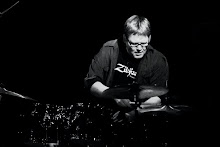These are indeed interesting times to be a drummer. More and more, the jobs I play involve "ear" work or at the most reading lead sheets. The only regular reading I'm guaranteed to do is once a month with John MacLeod's big band at the Rex, and even then, it's reading charts, which arguably require as much interpretation as reading.
So, should a young drummer not learn to read music? Nope, and I'll tell you why.
1. As reading is required less, it's also becoming a rarer commodity.
Being able to read music is one way of distinguishing yourself from other players, especially in situations that don't involve much rehearsal. Remember, if you can read, you can cut a lot of your heroes on the first run through of a piece of music. ( Admittedly, the second time might be a different story, but you get my point. )
2. If you need to learn something or remind yourself of something quickly, reading is the way to go.
If you want to have something be a part of your playing forever, by all means learn it by ear and memorize it, but sometimes we want our musical experience to be more ephemeral. Sometimes we're forced to record music we really DON'T want to remember! :) Reading helps with this.
3. Reading is not a difficult skill to learn and keep up.
The analogy has been made many times, but reading music and reading any language are the same thing. if you are literate, you certainly have enough brain power to learn to read music. Get a book and/or teacher and get it together, it can only help you.
I find personally that my reading can atrophy if I'm not doing it much, but I find it very easy to get it back in shape. Read classical snare drum etudes. The rhythms that you're reading are way more challenging than anything you'd see as a drum set player, and they usually have a lot of dynamics. ( Which you should be sight reading as much as the rhythms. )
This one I particularly like, but any orchestral snare book will work.
Monday, September 9, 2019
Subscribe to:
Post Comments (Atom)


No comments:
Post a Comment